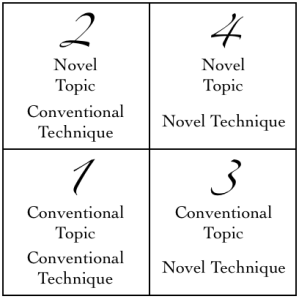
[Previously: Week 1 Review, Week 2 Review, Week 3 Review]
The fourth week of the challenge has ended. Here’s an update:
- I spent the week editing one of my short stories, and in that time the form and shape of the story has danced around a good bit. I’m currently starting the second round of editing (I guess you would call this Draft #3?), and I feel like it is settling down into something coherent and logical. Who knows if it’ll stay that way as I trudge on, but the great thing is this: I think it’s getting better. Time will tell if it ever ends up good, but it’s encouraging to see it is at least pointing in that direction and not the other way.
- As I laid out in last week’s post, I plan on eventually submitting these stories to publishers. I would say that I don’t know what to expect, but that would be a lie: I expect I’ll be rejected continuously for the foreseeable future. I’ve seen too many interviews with wonderful authors telling of the many years trying to get anything accepted to have much hope for the near-term. All the same, I plan on keeping you informed of my manuscripts’ journeys from the submission box to the trash heap.
- In fitting with these goals, I’ve done a little homework at the library this week. I went through the last four years of The Best American Short Stories, which if you don’t know is a great anthology series of stories published the prior year, and I tallied up the magazines and journals where these stories (and the list of “notable” stories in the back of the book) were published. So now I have a list of some ~120 or so places that could conceivably publish my stories (Ok, fine–The New Yorker ain’t never going to publish me).
- Here’s an interesting development: I’ve stopped timing how much I write every day. And here’s a related story why: One winter in college, I trained to run a marathon. I’m the kind of guy that gets really into numbers: I planned out my mileage week by week, wrote down my run times, optimized, dialed everything in. And you know what happened? A little more than a month before the race, I burned out after a 19 mile training run. My body was shot. My knees ached. I had pushed it too hard, driven to maintain a satisfying string of numbers in a spreadsheet. I never made it to the starting line. Since then, I’ve learned to run without a watch. To not calculate precisely how many miles my run is. To run by feel. And last week I realized that such an approach is probably also best for my writing: writing by feel, not to flesh out a quota, whether words or time. Which isn’t to say I plan on writing less or giving up on discipline, just that I tend to tip the other way into achievement obsession – and that is what I need to guard against.
One. More. Day.

The Darn Ecologist

